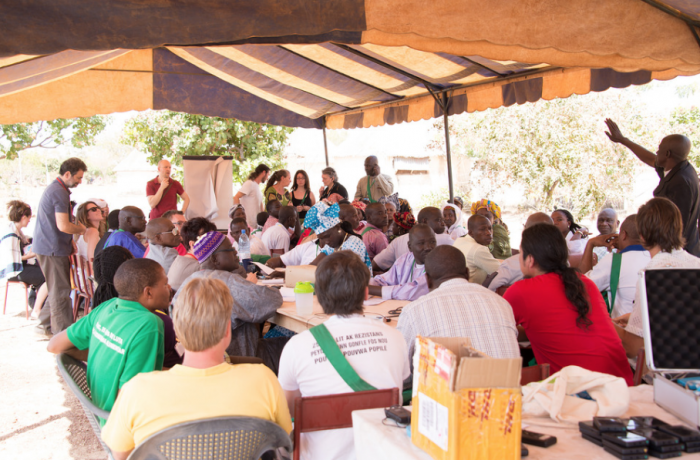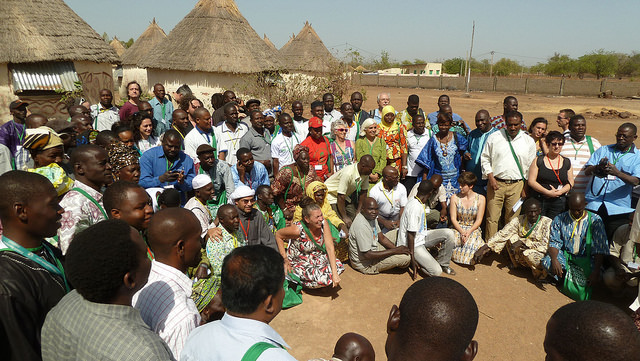March 2015: At the end of February, around 300 peasants, fisherfolk, pastoralists, indigenous people and consumer group representatives from all continents gathered in the town of Sélingué in Mali with the aim to articulate their vision of agroecology.
More photos: The Nyéléni Forum on Agroecology, 2015 (Flickr.com)
These groups of small scale food producers called for this event and also put it together under the title ‘International Forum on Agroecology’. The Coordination Nationale des Organisations Paysannes du Mali (CNOP Mali) hosted the Forum, which was co-organised by La Via Campesina, Movimiento Agroecológico de América Latina y el Caribe, Réseau des organisations paysannes et de producteurs de l’Afrique de l’Ouest, World Forum of Fish Harvesters and Fishworkers, World Forum of Fisher Peoples, World Alliance of Mobile Indigenous Peoples, and the More and Better Network.
They were supported by a small number of representatives of NGOs, academia and institutions. Janneke Bruil of AgriCultures Network member ILEIA attended the event and took part in the documentation team.
At the end of the Forum, a declaration was drafted and endorsed. Some excerpts:
- Dignity “As smallholders, we defend our dignity when we choose to produce in an agroecological way.”
Transformation “Agroecology is political; it requires us to challenge and transform structures of power in society. We need to put the control of seeds, biodiversity, land and territories, waters, knowledge, culture and the commons in the hands of the peoples who feed the world.” - Knowledge “The dialogue of our various forms of knowledge is based on respectful listening and on the collective construction of shared decisions.”
- Organization “Families, communities, collectives, organizations and movements are the fertile soil in which agroecology flourishes. Collective self-organization and action are what make it possible to scale-up agroecology, build local food systems, and challenge corporate control of our food system.”
- Legitimacy “We have built agroecology through many initiatives and struggles. We have the legitimacy to lead it into the future. Policy makers must respect and support our agroecological processes rather than continuing to support the forces that destroy us. We call on our fellow peoples to join us in the collective task of constructing agroecology as part of our popular struggles to build a better world, a world based on mutual respect, social justice, equity, solidarity and harmony with our Mother Earth.”
- The Forum was timely in a context where the term ‘agroecology’ is increasingly popular, but may also be used for purposes that go against the interests of small scale food producers. The first declaration of Nyéléni was drafted in 2007 and has been a reference on social movement’s perspective on food sovereignty ever since. This new statement signifies a further articulation of the vision of social movements on agroecology as the pathway towards food sovereignty.
The declaration is already supported by a group of international scientists in an open letter to the Food and Agriculture Organization of the United Nations. The AgriCultures Network is committed to support the Nyeleni process by continuing to build and share evidence-based knowledge on agroecology as practiced and promoted by food producers.
- Declaration of the International Forum for Agroecology, Nyéléni 2015
- The full report of the Nyéléni Forum
- Open Letter from scientists to FAO director Graziano da Silva in support of the February 2015 Declaration on Agroecology


